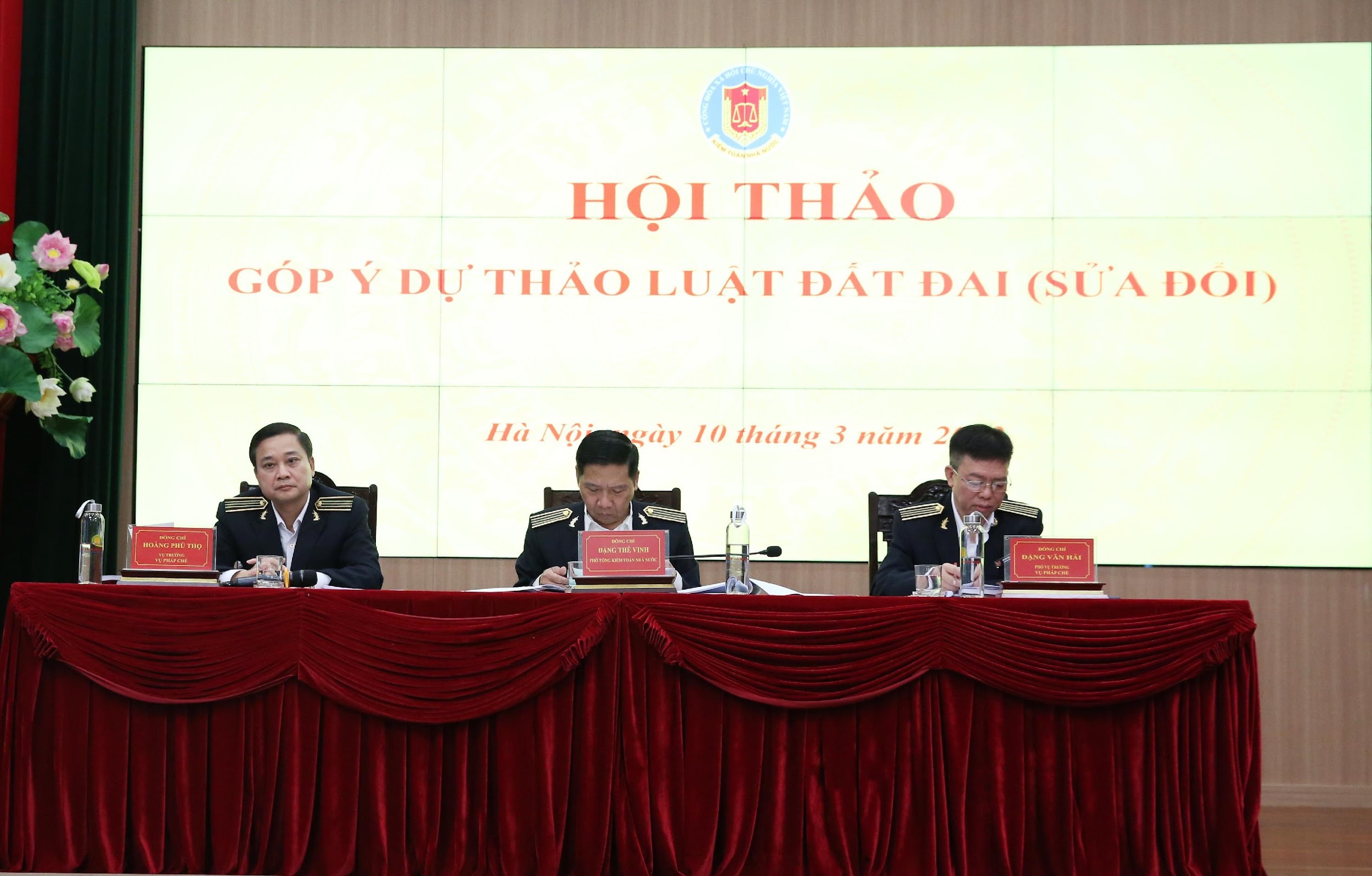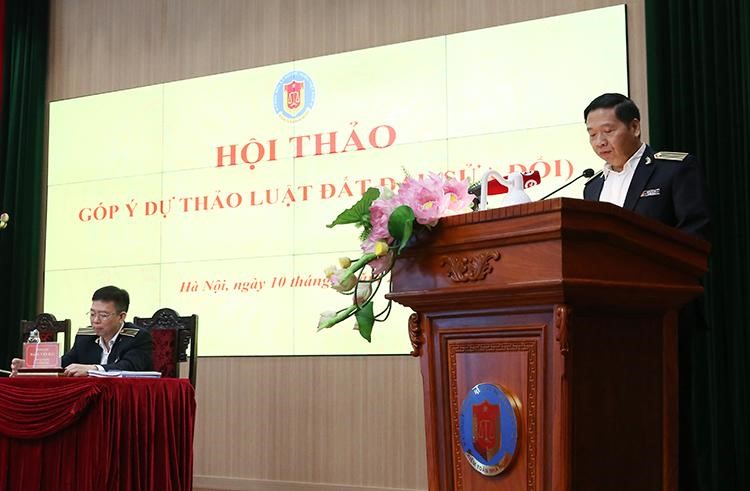On March 10, 2023, at its headquarters located at 116 Nguyen Chanh, State Audit Office of Viet Nam (SAV) organized a workshop on "Comments on the draft Land Law (amendment)". Deputy Auditor General Dang The Vinh and the heads of Legal Department co-chaired the workshop.

Chairing Committee of the workshop
The seminar was conducted in hybrid format, with both in-person attendance and online participation connecting 12 State Audit locations throughout the country.
Attending the workshop were Standing Member of the Finance and Budget Committee of the National Assembly Vu Tuan Anh; Deputy Director General of Economic Department, Office of the National Assembly Tran Vu Thanh; Deputy Director General of Land Department, Ministry of Natural Resources and Environment Le Van Binh. On SAV's side, leaders of SAV subordinate units and some experienced officials and experts in the field of land issues were also present.
Making his speech at the opening of the workshop, Deputy Auditor General Dang The Vinh said that after nearly a decade of the implementation of Resolution 19-NQ/TW of the 11th Party Central Committee, the land law policy has changed to better address practical requirements; gradually creating a legal corridor for the rational and economical management and use of land; land resources are exploited and used more effectively for socio-economic development, ensuring national defense and security, contributing to solving social problems, enabling greater equality among stakeholders, initially overcoming the arbitrary and rampantly situation of land allocation and leasing. The stakeholders’ interest in compensation, support, resettlement, land acquisition as well as the livelihoods of people whose lands have been acquired is better taken care of and guaranteed; Rights and obligations of organizations, households and individuals are promoted, particularly in the field of agricultural land use.
Nevertheless, the Land Law and a number of related legal documents continue to overlap with inconsistency and asynchronism; the settlement of residential and production land for ethnic minorities and some places remains moderate; compensation, support, resettlement and land recovery in some localities are not carried out in a proper manner.
"The abovementioned limitations and weaknesses are caused mainly due to the lack of a high consensus in terms of viewpoints on some issues related to land management and use in the social-oriented market economy, specifically the importance and significance of the entire people's ownership of land for the State as the owner's representative and unified management. Policy and legal awarness about land are incorrect and incomplete in some places; the understanding and compliance with the law on land of a part of officials and people remain limited due to the historical nature, complex and sensitive origin.” – Deputy Auditor General emphasized.

Deputy Auditor General Dang The Vinh delivered the speech
From the limitations and shortcomings identified, in order to institutionalize the Party's principles and policies, particularly the viewpoints, objectives, tasks, and solutions set out in Resolution 18-NQ/TW and to overcome the limitations and shortcomings of the Land Law 2013, the Government has assigned the Ministry of Natural Resources and Environment to coordinate with other relevant ministries and agencies to draft the revised Land Law and is currently seeking public feedback.
Deputy State Auditor suggested that delegates and experts inside and outside the field share opinions, exchange ideas and discuss the entire Draft Land Law (amended) from different perspectives, focusing on some major issues such as planning, land use planning; auctioning land use rights; land reclamation, compensation support, resettlement; land finance; SAV's position and role in land audit, etc.
At the workshop, delegates listened to presentations and discussions about the followings: Main audit findings in improving land-related mechanisms and policies through audit activities of the SAV; Some regulations on finance and land price in the draft Land Law amendment from SAV's perspective; Land valuation methods - limitations and drawbacks in audit practice; Some shortcomings in land use right auction and compensation and resettlement through audit; Completing SAV regulations on land in the draft Land law (amendment).
The presentations highlighted the shortcomings of mechanisms and policies in land allocation, conversion of land use purposes, rent exemption and reduction policies for investment incentives; land valuation method; implementation difficulties in land leasing policy; limitations and shortcomings in project implementation under the BT form, etc.
During the course of the workshop, Vu Tuan Anh - representative of the law appraisal agency, and Le Van Binh - representative of the drafting agency, highly praised SAV's opinions. Both believed that these opinions will contribute to assisting the appraisal and drafting agencies in making an in-depth, comprehensive and practical evaluation in the process of completing the draft law. Moreover, the representatives of the drafting and appraisal agencies clarified some of the revised contents in the draft law, such as land use rights auction, collection of public service fees from land, land price list construction, and land rent payment for state-owned enterprises.
Overview of the Workshop
At the end of the workshop, Deputy Auditor General Dang The Vinh highly appreciated the efforts shown in in-depth presentations and speeches that demonstrated a high sense of responsibility from the rich practical experience and profound theoretical knowledge of experts inside and outside the Office, contributing to enabling the seminar to successfully accomplish its goals and objectives. Deputy Auditor General stated that the opinions expressed at the seminar would be summarized in a report of SAV's opinions on the draft Land Law (amendment) to be sent to the Government and the Economic Committee of the National Assembly./.